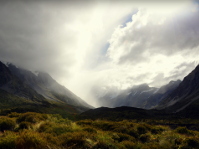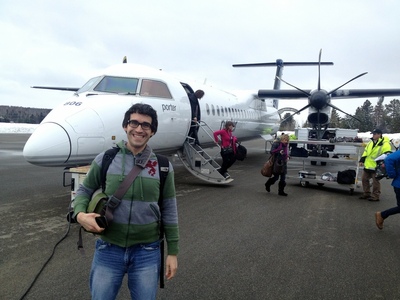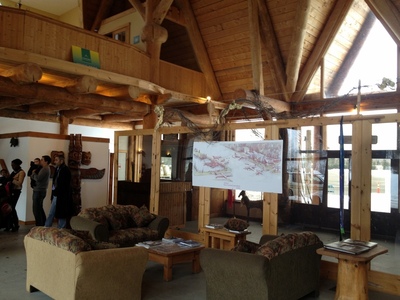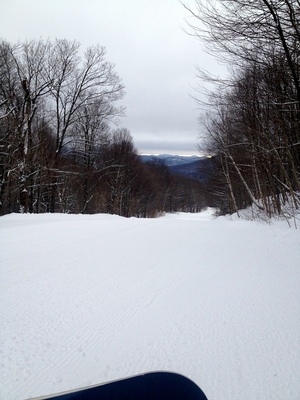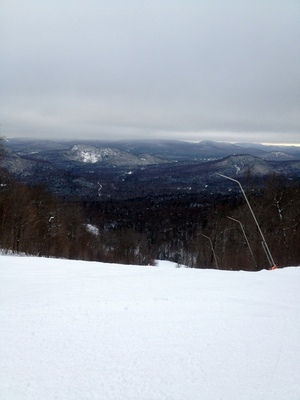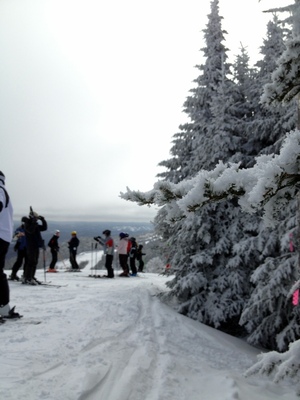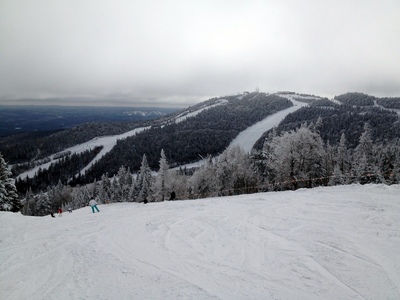It's not that I haven't been reading lately, or even that I've been skipping blogging about the books I read. The reason I haven't posted about a book since the end of October is that the book I was reading since then was Infinite Jest by David Foster Wallace. It is an epic-sized book in every sense. 981 pages of small type (in trade paperback format), followed by 96 pages of endnotes in even smaller type (which are required reading to actually understand what is going on). Beyond the physical size (and weight!), the actual text is daunting and challenging. It takes place in the near future but much has changed in the world and the book doesn't waste much time explaining the lay of the land. You just sort of pick it up along the way. Add invented slang, a large cast of characters (who are never thoroughly introduced), intense non-linearity, and obscure self-references and you get a book that requires significant attention while reading if you want to make progress.
I am glad I read it, but it was hard work and took a long time is what I'm saying.
I don't even know how to talk about it here, so I'm going to defer to the comments of smarter people than myself. One remark I quite liked came from Jay McInerney in his review of the book for the New York Times: "While there are many uninteresting pages in this novel, there are not many uninteresting sentences." The writing is spectacular but sometimes it goes off on tangents, and those tangents grow their own tangents and you find yourself so far from where you started that you're not even sure you're reading the same book. Like the endnotes, of which there are 388, some of them have their own footnotes!
Fortunately for me, I think, I enjoy tangents. Even when whole chapters pass that have nothing to do with the plot of the book, it's all still fascinating and engaging. I loved the language and words he used, like cardioid and demapping, but most of all the idiom "howling fantods," defined perfectly by Urban Dictionary:
A stage 4 case of the heebie jeebies.
Realizing that, after all this time, as I approach the end of this 981 page novel with 96 pages of footnotes, as much as I have loved every run-on sentence and obscure pharmacological reference I still cannot coherently answer the frequently-asked and painfully-simple airplane-seatmate question "what's it about?" has giving me a serious case of the howling fantods.
There is much reference to Québec separatism, despite being an American novel written by an American. In the near-future world of the novel (remembering that it was written pre-referendum in the 1990s) the cause of separatism has escalated rather than calmed, with multiple Québec terrorist groups causing problems all over North America (including the assassination of Jean Chrétien apparently). Although that all sounds serious, it's presented in a pretty ridiculous, slap-stick manner that is endlessly amusing (to me at least). The chief terrorist group of the book is Les Assassins des Fauteuils Rollents (AFR), the wheelchair assassins, whose back-story consumes eight pages of endnotes and is far to involved to cover here. It's all great stuff though and any book that spends time discussing Canada in any way always seems more engaging to me.
The book finishes at a strange point with many unanswered questions. Upon completion I remembered that the very first twenty pages or so take place about a year after the events at end of the book. I went back and re-read them, only to realize that that section has a whole different meaning than my first interpretation. This is a book that must be read multiple times in order to extract all it has to offer, but I'm not sure I'll be up to trying again for a couple years. I poked around online for interpretations and it appears to be an activity of some interest on the Internet, piecing together what may have happened in the year between the end of the novel and the events of the first twenty pages.
This hasn't been a very coherent blog post. Despite my attempts to improve my writing skills I do not have the talent necessary to discuss a book of this magnitude in any meaningful way. It is just too big. If you're interested in learning more, check out the introduction to the tenth anniversary edition written by David Eggers; it's spot on.
Myself, I will close with the synopsis from the original edition in an attempt to at least convey what the book was about.
Infinite Jest is the name of a movie said to be so entertaining that anyone who watches it loses all desire to do anything but watch it. People die happily, viewing it in endless repetition. The novel Infinite Jest is the story of this addictive entertainment, and in particular how it affects a Boston halfway house for recovering addicts and a nearby tennis academy, whose students have many budding addictions of their own. As the novel unfolds, various individuals, organizations, and governments vie to obtain the master copy of Infinite Jest for their own ends, and the denizens of the tennis school and the halfway house are caught up in increasingly desperate efforts to control the movie - as is a cast including burglars, transvestite muggers, scam artists, medical professionals, pro football stars, bookies, drug addicts both active and recovering, film students, political assassins, and one of the most endearingly messed-up families ever captured in a novel. On this outrageous frame hangs an exploration of essential questions about what entertainment is, and why it has come to so dominate our lives; about how our desire for entertainment interacts with our need to connect with other humans; and about what the pleasures we choose say about who we are. Equal parts philosophical quest and screwball comedy, Infinite Jest bends every rule of fiction without sacrificing for a moment its own entertainment value. The huge cast and multilevel narrative serve a story that accelerates to a breathtaking, heartbreaking, unforgettable conclusion. It is an exuberant, uniquely American exploration of the passions that make us human - and one of those rare books that renew the very idea of what a novel can do.
